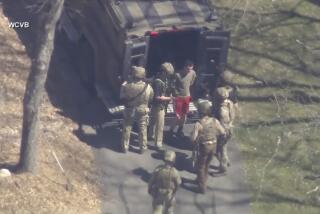West to Ease Rules on Tech Sales to Eastern Europe : Trade: The United States and its allies have agreed to set up a task force to develop new regulations. But there is no accord on how far to go.
- Share via
WASHINGTON — The United States and its major economic allies agreed in principle Friday to ease restrictions on the sale of sensitive technology to East European countries, but they remained sharply divided over how rapidly to relax the restraints.
After a contentious two-day meeting, State Department officials announced that the Western governments had reached consensus on the need to liberalize current rules governing high-technology sales to the former East Bloc. The closed-door session was held in Paris.
But, in an indication of a continuing split, the accord primarily addressed procedural issues. The group decided to set up a new task force to make recommendations for paring current rules affecting trade in computers, machine tools and telecommunications equipment.
The participants also agreed to reduce the time it takes for a Western country to win approval to ship specific products to former East Bloc countries to eight weeks, from the 12-week wait that has prevailed in recent years.
The task force is slated to make its report in June.
In a modest but significant victory, the United States succeeded--at least for the moment--in persuading its allies not to lift restrictions on high-technology sales to the Soviet Union at the same time it is doing so for the former Soviet satellites in Eastern Europe.
Most Western European governments had wanted to include the Soviet Union in an effort to boost their trade with Moscow. But Washington demurred, contending that the Soviet Union still poses a military threat to the West, while the former satellites do not.
U.S. officials conceded that Friday’s accord was a ploy to buy time in hopes that further discussions--combined with developments in Eastern Europe--will enable the allies to resolve their differences over the technology-transfer issue.
American officials have been worried that unless the two sides can work out a compromise, Western European countries would simply abandon the current system and authorize any sales they want, leaving the security apparatus in shambles.
Friday’s session took place under the aegis of the Paris-based Coordinating Committee for Multilateral Export Controls, which was set up after World War II to regulate sales to the East Bloc. The group, known informally as Cocom, has 17 member countries.
Friday’s result indicated continued rough going for the Bush Administration, which has been struggling to keep Cocom together in the face of mounting pressure from Western Europe to boost its high-tech trade with the former Eastern Bloc.
The European countries had been pressuring for a so-called “green-line” approach that effectively would exempt most items below a specified level of technology--a procedure now used for sales to China--but Washington had opposed the idea as too risky.
After months of internal wrangling, the Administration came up with a modest proposal in December for easing a few of the current restrictions.
But the Europeans balked, charging that Washington was trying to protect American business at the expense of sales by European firms.
The Europeans lost no time Friday in complaining about what they perceived as U.S. intransigence at this week’s session. “We had hoped for much more, following the President’s (recent) statement” on the issue, a European policy-maker said.
But U.S. Deputy Secretary of State Lawrence S. Eagleburger insisted that the Administration “understands that Cocom has to adjust” to recent changes in Eastern Europe. “This is a process that is not yet completed,” he said.
More to Read
Sign up for Essential California
The most important California stories and recommendations in your inbox every morning.
You may occasionally receive promotional content from the Los Angeles Times.













